To prevent lead poisoning, Central Falls is turning up the heat on landlords
The story was originally published in The Public's Radio with support from our 2023 National Fellowship.
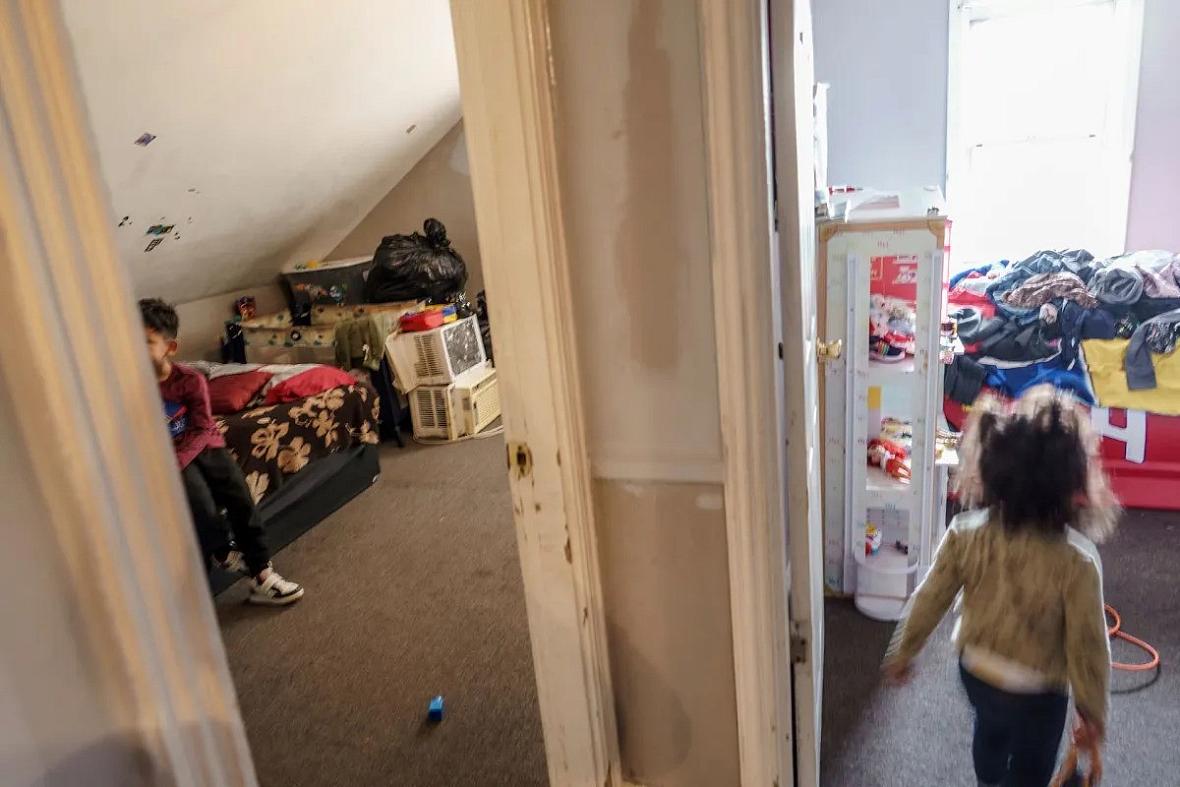
A test showed Sofia, 2 years old, had an elevated level of lead in her blood while the family lived in this Central Falls apartment.
Jodi Hilton for The Public's Radio
Property owners filtered into the multi-purpose room in the Central Falls public works building on a hot September night, settling into plastic chairs. Attorneys for the city printed off dockets, stacked up manila case files, and set up a tape recorder, all in preparation for the monthly meeting of municipal housing court.
Many of the landlords were on the docket to update the city about the progress they’ve made obtaining legally mandated “lead certificates,” documentation that shows rental units have been inspected and are safe from hazards like poisonous lead dust or chipping paint.
Assistant city solicitor Tyler Romero took the stand running thin on patience.
Pine Street Realty, a company that owns dozens of rental units in the city, was back in court for allegedly failing to obtain lead certificates. A two-year-old had been exposed to low levels of lead while living in one of the dozens of apartments the company owns. And the child’s mother was pregnant.
At the time, Romero was at the helm of an effort in Central Falls to identify properties in the city without lead certificates, and to hold landlords accountable for failing to obtain them. The city has prided itself on educating and supporting property owners, rather than using its authority to levy financial penalties. But lately, as some landlords draw out the process and kids keep getting sick, Central Falls has started turning to more aggressive measures.
“The concern for us today is not just the presumption of lead in the unit,” Romero said, addressing Judge Bob McConnell. “On top of that, the owner is Pine Street Realty, whose organization we’ve had challenges with for a few months now.”
Tension hung in the air. The city had first notified the company of the missing lead certificate in the apartment two and a half months prior. Frustrated, Romero requested the court authorize the city to fine the company $100 for each day that passed without a lead certificate in the unit where the toddler was living.
The Pine Street Realty property manager took the stand without contesting the fines, but noted the tenant living in that particular apartment had stopped paying rent.
Mila Quinones listened closely from the plastic chair where she sat in the back row. She had stopped paying rent, withholding it after a housing inspector found code violations in the apartment.
Tenant organizers Shana Crandell and Cherie Cruz from the progressive group Reclaim Rhode Island sat alongside her. They’d been helping Quinones understand her rights as a tenant, including that she could come to housing court and testify against her landlord.
Romero briefly questioned her on the stand, before turning his attention to another matter: the more than 50 other units that Pine Street Realty owns that, at the time, allegedly lacked lead certificates. He requested Judge McConnell grant permission to initiate daily fines against the company for a subset of those units, too.
McConnell was quick to authorize the fines against Pine Street Realty. It was the first time the city took such punitive action.
“You have to have carrots and sticks,” McConnell said in an interview. “And the stick has to be in enforcement.”
The judge then went one step further: he told Pine Street Realty not to evict Quinones, even though she had stopped paying her rent. Such action, he said, would be retaliatory because of the ongoing housing court case.
Six days later, Quinones’ third-floor unit at 692 Pine Street was certified as lead safe.
Three weeks later, Pine Street Realty filed an eviction case against Quinones.
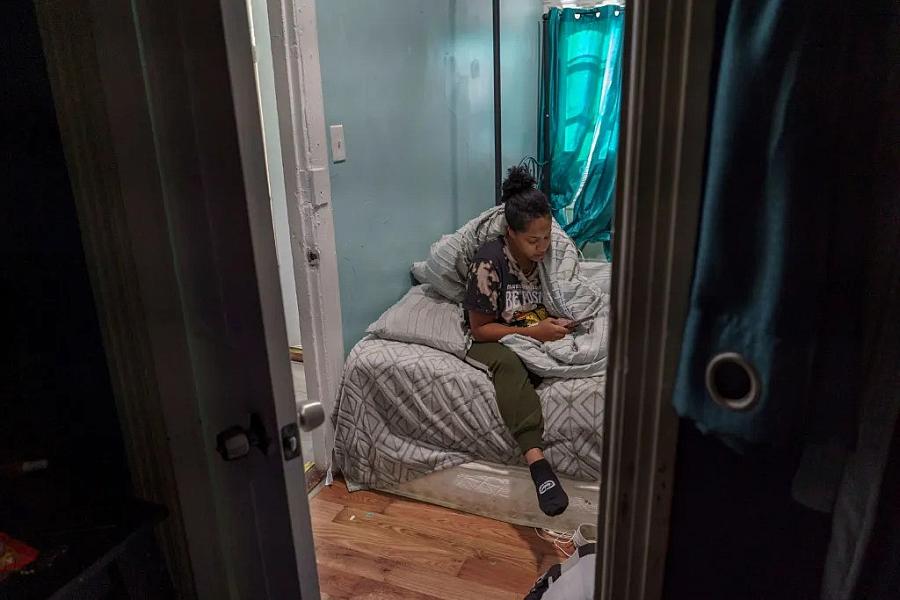
Mila Quinones had to move out of her apartment before midnight on October 31st, 2023. By mid-afternoon, she was still looking for somewhere to go.
Jodi Hilton for The Public's Radio
‘We have to do what we have to do’
For the past several years, each year, roughly 500 children in Rhode Island are found to have dangerous levels of lead in their blood, in most instances the result of living amidst toxic paint. The federal government banned the use of lead paint in 1978, but that did little to address the layers and layers of old, hazardous paint lining the walls, window frames, and door jambs of many Rhode Island homes.
Old paint can create poisonous lead dust, one of the more common sources of exposure today, according to the Rhode Island Department of Health. At high levels, lead can cause seizures, damage vital organs, and in extreme instances, result in death. At the lower levels that are more common today, lead exposure can cause behavioral problems and learning disabilities down the road, but there often aren’t immediate symptoms.
“[That] is what makes it imperative for us to screen these children before their levels climb up,” said Dr. Chandan Lakhiani, a pediatrician who runs the lead clinic at Hasbro Children’s Hospital.
In an effort to reduce the risk of exposure, Rhode Island law requires landlords to hire licensed lead inspectors to evaluate rental units and deem them lead-safe. Cities and towns have the power to cite property owners for missing lead certificates, but according to an investigation by The Public’s Radio, in the most-affected cities, landlords rarely face consequences for failing to comply.

Central Falls Mayor Maria Rivera said she feels responsible for the health and wellbeing of children, so she pushed to ramp up local enforcement of lead safety laws.
Jodi Hilton for The Public's Radio
The city of Central Falls, home to roughly 4,000 rental units, has been lauded as an exception. Most residents of the square-mile city are renters, and most of the rental housing stock was built before 1978, when lead paint was common. During the pandemic, rates of lead poisoning in the city jumped as kids spent more time in homes that likely contained hazardous lead paint.
“As the mayor of the city, I feel responsible for the health and wellbeing of the children of this community,” Central Falls Mayor Maria Rivera said in an interview. “I knew we had to do something.”
The city received grant funding from Rhode Island Housing to tackle the lead poisoning problem by hiring an additional part-time city solicitor and bringing on a full-time housing inspector. That has allowed the city to take a uniquely proactive approach. While other municipalities wait for tenants to complain about other building problems or for kids to get lead poisoned to identify properties without lead certificates, Central Falls has spent the past three years trying to get ahead of the problem.
City inspectors look for uncertified properties and notify landlords of their obligations to provide lead-safe housing. If after two notifications from the city property owners still don’t comply, Central Falls brings them to municipal housing court. Since 2021, roughly a quarter of the properties the city has identified ended up in housing court for resolution.
Once a landlord is in court, Judge McConnell and city staff explain the regulations, provide lists of licensed lead inspectors, and help property owners connect to grant funding that can cover the costs of mitigating the hazards associated with lead paint.
“I don’t believe in penalizing people,” Rivera said. “For me, it’s really important to educate the community [about] what it is that needs to be done.”
So far, this approach has helped secure lead certificates for over 800 rental units in the city. But cases often linger in court for months, pushing the city to sometimes trade in carrots for sticks.
“We’re giving you all of these chances,” Rivera said. “[If] you’re not taking an opportunity and you’re not taking advantage of the support that we’re giving you, then we have to do what we have to do.”
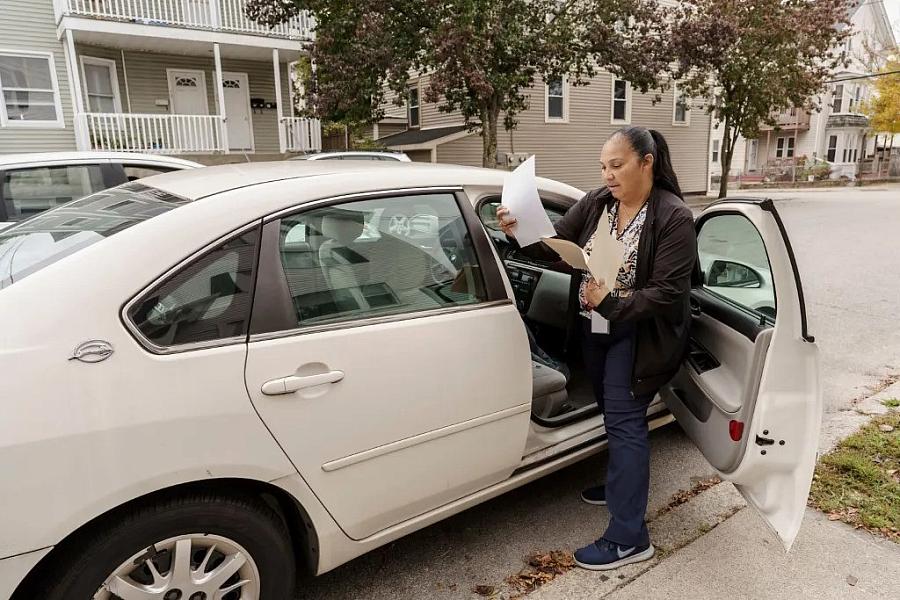
Annette Martinez, Central Falls’ only housing inspector, prepares to inspect a building with alleged lead certificate violations on October 18th, 2023.
Jodi Hilton for The Public's Radio
‘I can’t be paying for my kids to get sick’
After the September session of municipal housing court, the lead inspection team had learned of a second child who had an elevated level of lead in her blood. Again, the toddler lived in an apartment where the city had already notified the landlord of her obligation to have the unit inspected, mitigated if necessary, and to get a lead certificate.
On a brisk October morning, city housing inspector Annette Martinez and her colleague Heidi Silverio Roias climbed the narrow staircase to a third-floor apartment on Darling Street. Roias had just taken over running the Central Falls lead certificate enforcement team from Tyler Romero.
The tenant, Marisa, welcomed the women into her apartment. She is undocumented and requested The Public’s Radio use her nickname so as not to jeopardize her status in the United States. Martinez, the housing inspector, had been there before. In August, a blood test had shown Marisa’s two-year-old daughter had elevated levels of lead in her body.
“What I’m really worried about is that her lead level will go up,” Marisa said in Spanish. “Paint is still falling and no matter how much we watch out for her, they’re just kids.”
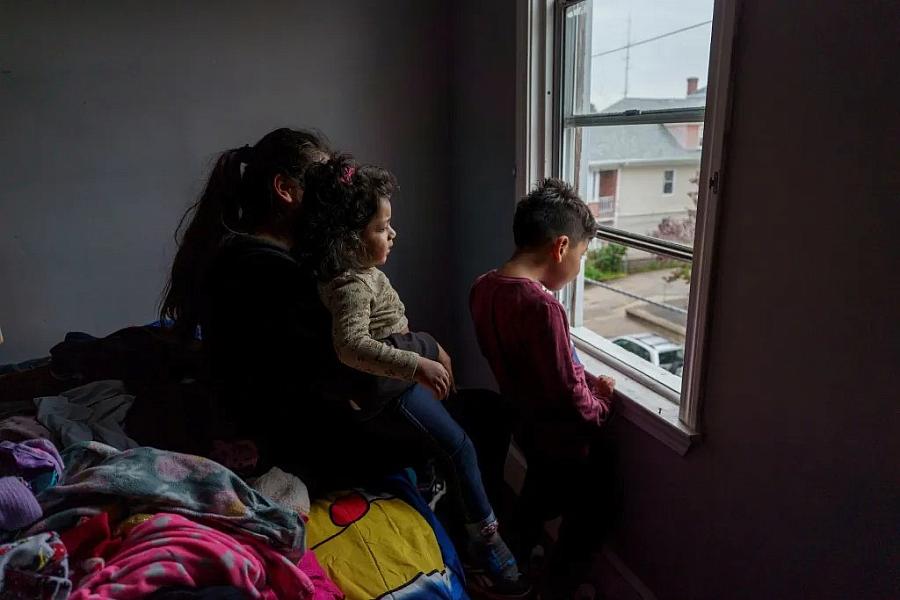
Marisa and her two kids sit by her bedroom window on October 18th, 2023. Two months prior, she learned her two-year-old had elevated levels of lead in her blood. She is still waiting for the landlord to make repairs.
Jodi Hilton for The Public's Radio
The Central Falls lead team first encountered the Darling Street property on the spreadsheet that underpins much of the city’s lead certificate enforcement efforts. The spreadsheet lists the properties in the city that should be certified as lead-safe, but aren’t. In an effort to support local enforcement of the lead certificate laws, the Rhode Island Department of Health hired a data firm to help create the Central Falls list, as well as lists for Woonsocket and Providence. According to the agency, a Pawtucket list is in process, and they hope to create one for Newport, too.
The list provides Central Falls with a road map. When the city started enforcing the certificate laws a few years ago, it organized the sheet alphabetically by street name and started notifying landlords one by one of their obligation to get a lead certificate. So far, the city has made it through the letter “K”.
Records show the city twice alerted the Darling Street landlord, Esther De Los Santos, that the three rental units in the property lacked lead certificates, but she never complied. Months passed without action. On average, it takes eight months to resolve a lead certificate case in Central Falls housing court, according to records obtained by The Public’s Radio.
“When you have one attorney, the housing inspector that’s not just focused on lead, it just takes a lot longer,” Mayor Rivera said. “If they could focus just on lead, then we would move this process a little bit faster.”
The Darling Street case resurfaced when Marisa called the city after she found out her daughter had lead in her blood. The city then issued an emergency summons, notifying the landlord that she would have to appear at municipal housing court.
And still, Roias said progress had been slow.
“We’ve been hitting roadblocks,” she said. “We try to talk to them and maintain contact, and just keep reiterating how important it is that they need to get this fixed.
Marisa said the pediatrician instructed her to give her daughter multivitamins which can help the body process lead and reduce the level. But the best way to ensure her daughter’s lead levels fall to zero is to eliminate the hazards.
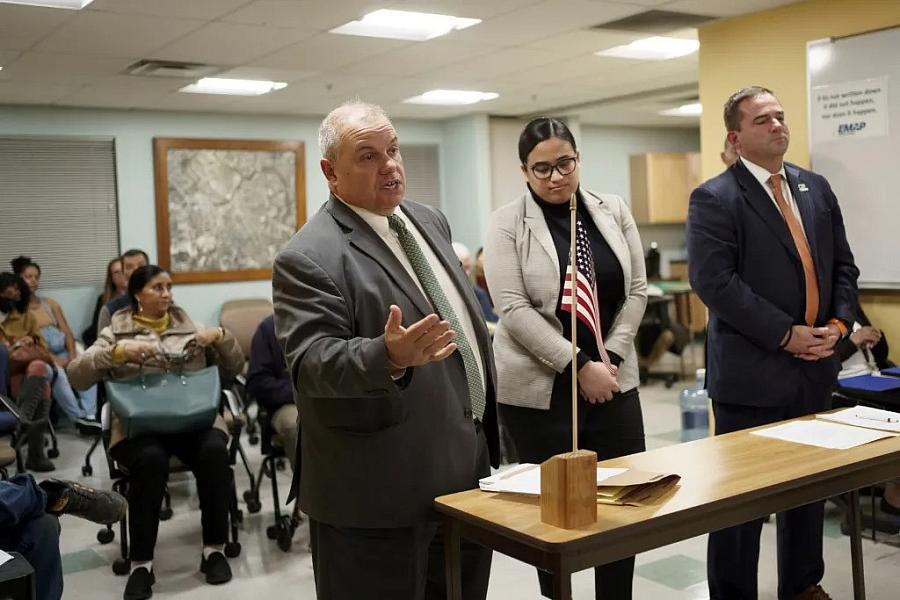
Esther De Los Santos and her attorney Jeffrey Garabedian, left, in Central Falls municipal housing court on November 8th, 2023. City solicitor Matt Jerzyk, right, represents the city.
Jodi Hilton for The Public's Radio
When De Los Santos, the landlord, appeared in housing court under the emergency summons, she brought an attorney. Her off-white blazer and heels contrasted with the drab linoleum tiles, pale yellow walls, and fluorescent lighting at the Central Falls public works building.
City solicitor Matt Jerzyk explained the city could charge her a $17,750 fine for failing to obtain a lead certificate over the past year, during which time Marisa learned about her daughter’s elevated lead level. For the second time in as many months, Central Falls was exploring testing its punitive power to bring landlords into compliance with the lead certificate laws.
But Jerzyk continued: De Los Santos could avoid those fines if she agreed to get the apartment inspected for lead hazards, and submit a plan for addressing any issues in the next two weeks. De Los Santos agreed. De Los Santos’ attorney, Jeffrey Garabedian, said in early February she was waiting for Rhode Island Housing to follow through on an application for funding to cover the costs of repairs.
Meanwhile, Marisa and her kids would continue to live in the apartment where they suspect peeling and chipping paint caused the toddler’s elevated lead levels.
“I can’t be paying for my kids to get sick,” she said.
A $38,000 judgment
Midway through the November session of municipal housing court, Central Falls turned its attention to Pine Street Realty, the company the city had decided to fine back in September. Now, the city would evaluate how much the company owed and whether any of the work obtained lead certificates had been done.
A representative of Pine Street Realty declined to comment for this story, and the company’s attorney did not respond to interview requests.
Mila Quinones sat in a chair in the back of the room with Cherie Cruz, the tenant organizer from Reclaim Rhode Island, by her side. (Cruz is also a state representative). Pine Street Realty had ignored the housing court judge’s order and at the end of September filed to evict Quinones in Providence County District Court. She settled the case and had moved out a week before, on Halloween. Now seven months pregnant, she had found a temporary room to rent with her two-year-old son, but hadn’t found anywhere to settle.
Anticipation grew around the long conference table from which Judge McConnell, the city clerk, the housing inspector, and the city solicitors conduct housing court.
Jerzyk called Linh Duong, one of the managers of Pine Street Realty, to the stand. The work, Duong said, was done and he had copies of lead certificates to prove it. Even so, Jerzyk argued, the company had missed the deadline the court imposed back in September, so it should still have to pay the fines that had been accruing on five properties for nearly two months — roughly $33,000 in total.
Judge McConnell agreed and ordered the company to pay. Never before had Central Falls taken this step, ordering a landlord to pay a fine for missing lead certificates.

Mila Quinones takes the stand next to Linh Duong of Pine Street Realty in Central Falls municipal housing court on November 8th, 2023.
Jodi Hilton for The Public's Radio
Jerzyk then looked towards the back of the room, where Quinones sat. Pine Street Realty, he argued to Judge McConnell, had violated the September court order not to evict her. To Jerzyk, that put the company in contempt of court. He proposed the city fine the company an additional $5,000.
Before turning to the judge for a decision, Jerzyk called Quinones to testify. She explained she expected the apartment to be up to code when she moved in, and that she contacted the city housing inspector when she noticed issues.
“I have done everything in my power to just provide a safe place for my children,” Quinones said, her voice shaking. “They knew that they were not supposed to evict me and I am now homeless.”
Under oath, Duong admitted to filing the eviction in district court. Judge McConnell said that was evidence he violated the order, and approved the $5,000 fine the city requested.
Quinones thanked McConnell as relief washed over her. She hugged Cruz, the tenant organizer, and walked outside into the cold November air.
“That a company was explicitly told by our judge not to evict a tenant, and in a matter of weeks, they evicted the tenant who is pregnant, it just shocks the conscience, that type of behavior,” Jerzyk said after the court hearing. “It needed to be addressed publicly, and we hope landlords get the message loud and clear.”
Pine Street Realty now owes Central Fall roughly $38,000. But the city has yet to collect the fines, and the case is still pending.
Quinones said she felt the risk she took by speaking up was worth it, and hoped it would push cities to ramp up enforcement of the lead laws to protect families.
“This is a big win for my kids,” Quinones said. “I feel like it wasn’t for no reason, everything I lost.”

